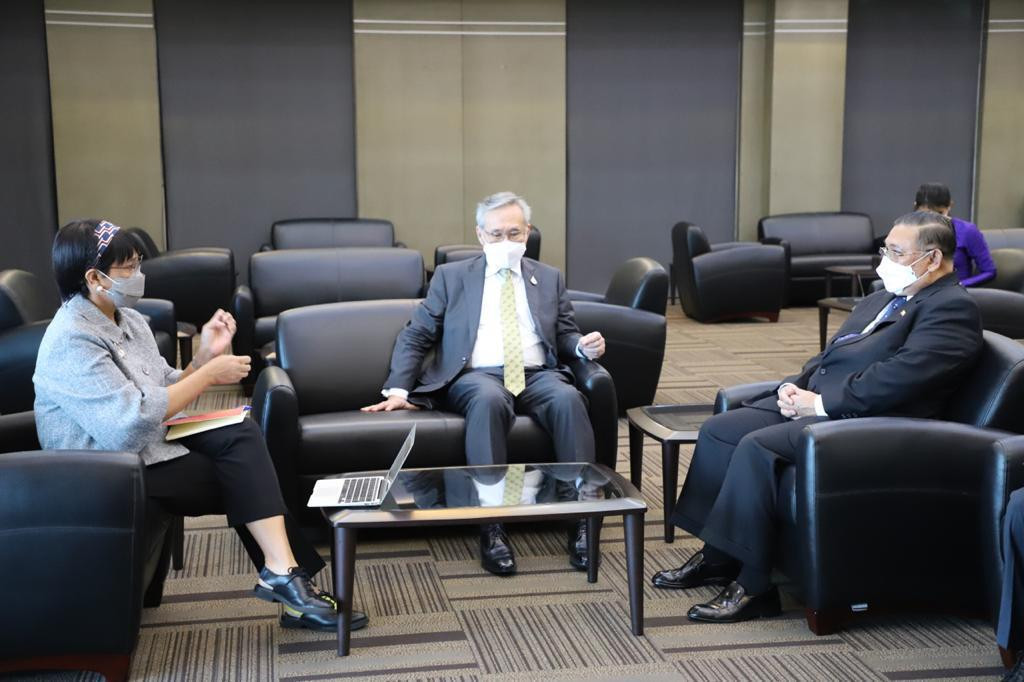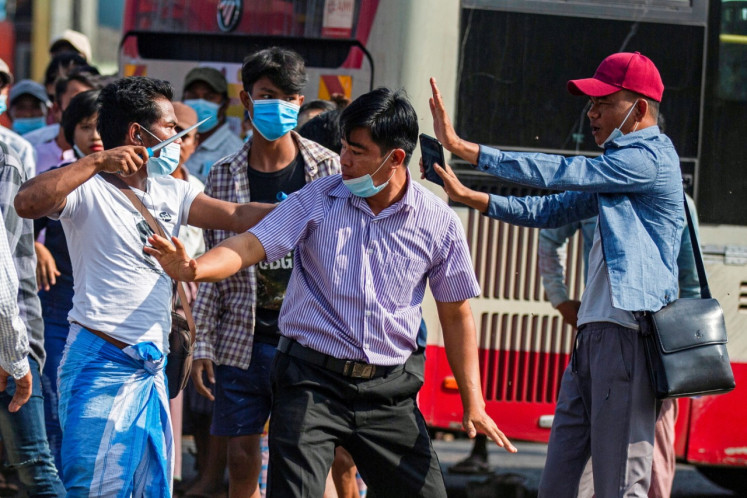Popular Reads
Top Results
Can't find what you're looking for?
View all search resultsPopular Reads
Top Results
Can't find what you're looking for?
View all search resultsWhirlwind diplomacy moves needle in ASEAN
From grounded flights to tight COVID-19 checks, the meeting between Indonesia's foreign minister and a representative of Myanmar's post-coup junta in Thailand was a feat of pandemic-era diplomacy, but whether it will achieve the intended results remains to be seen.
Change text size
Gift Premium Articles
to Anyone
A
s the world followed the developments in post-coup Myanmar on Wednesday, a picture of Indonesian Foreign Minister Retno LP Marsudi speaking to a representative of the junta surfaced. Thai Foreign Minister Don Pramudwinai sat between them in what appeared to be a lounge area at Asia’s oldest operating airport, Don Mueang International, located on the outskirts of Bangkok.
The meeting was a last-minute amendment to Retno’s whirlwind shuttle diplomacy tour, after the cancellation of her flight to Myanmar, which was supposed to be the last leg of her trip.
On Feb. 1, Myanmar’s military, the Tatmadaw, seized power from civilian leader Aung San Suu Kyi’s democratically elected government just before the country’s parliament was set to convene for the first time.
Retno soon took the lead in the ASEAN response to the crisis, beginning with a series of visits to Brunei and Singapore last week. She visited Thailand on Wednesday and was supposed to fly to Myanmar on Thursday as the first foreign official to visit the country since the military putsch.
But the plan to visit Myanmar went public before it occurred and elicited a strong response from the people of Myanmar, who feared that the trip would be a tacit acceptance of the junta’s control. The minister decided to cancel the visit on Wednesday evening, with a spokesperson from the Foreign Ministry citing “current developments and consultations with other ASEAN countries”.
Retno eventually met U Wunna Maung Lwin, whom the post-coup junta has appointed foreign minister, after Thailand’s top diplomat offered to facilitate the meeting, having also opened a line of communication with the Committee Representing Pyidaungsu Hluttaw (CRPH), which represents ousted members of Myanmar’s parliament.
Read also: ‘To do nothing is not an option’: Indonesian foreign minister defends meeting junta
Retno’s chief of staff, Achmad Rizal Purnama, said Indonesia had kept the possibility of visiting Myanmar open. However, it was Thailand that had arranged for the meeting to occur at Don Mueang.
“When we were told that he was here, of course we were open to meeting him. But until the last minute we didn't know [where the meeting was going to take place]. We had to go to the airport for our 3 p.m. return flight and that’s when we were told that the meeting would be at the airport,” Rizal told The Jakarta Post on Friday.
In the approximately 20 minute meeting, the minister reiterated Indonesia’s concerns and called for all parties to exercise restraint and avoid the use of force to prevent bloodshed. She also pressed the junta representative on the importance of undertaking an inclusive transition to democracy. She then returned to Indonesia.
Indonesian diplomats have, from time to time, used “shuttle diplomacy”, parleying among counterparts from other countries to coordinate a collective response on an issue – not unlike the back-and-forth shuttling of badminton, a national sport.
While the recent effort may have been Retno’s boldest at shuttle diplomacy, it wasn’t her first.
In 2017, the minister visited Myanmar and Bangladesh to address the humanitarian conflict affecting the Rohingya Muslim minority in Myanmar’s Rakhine state.
Read also: Indonesia ‘shuttles’ to Brunei for Myanmar coup response
It was also a practice that her predecessor, Marty Natalegawa, occasionally used to respond to regional crises, including the Thailand-Cambodia crisis in 2011 and the diplomatic fiasco over an ASEAN joint statement on the South China Sea dispute in 2012.
This time around, the COVID-19 outbreak created practical challenges that hadn’t existed before, particularly in the absence of an ASEAN-wide essential travel corridor.
“Shuttle diplomacy is not easy to undertake during the pandemic,” Retno said in a statement on Wednesday.
Rizal said flights were practically nonexistent, especially because the minister preferred using commercial airlines while on duty. Most passenger flights were grounded.
Furthermore, strict health protocols in Thailand turned the usual reception into an otherworldly affair. Teams of officials in full personal protective gear received the Indonesian delegation, Rizal said, and on several occasions the delegates were asked to use back doors or were asked to self-isolate in hotel rooms until COVID-19 test results came back negative.
The minister was accompanied by a lean entourage, Rizal said, consisting of Rizal himself, the minister’s secretary and two senior officials overseeing Asia-Pacific and African affairs and ASEAN affairs.
Read also: ‘The show must go on’: How the pandemic shapes Indonesian diplomacy at the UN
“Prior to the pandemic, the delegation usually included an operational unit consisting of the relevant director general, directors and the staff in charge. Sometimes there were also people from other ministries – and from the private sector when we were on economic diplomacy missions,” he said.
Efforts are underway to hold a special meeting of ASEAN foreign ministers to address the Myanmar situation, amid growing reservations about a regional solution.
The minister said she believed it was necessary for Indonesia to take up the mission as a matter of principle and because of the country’s strong desire to contribute to regional peace, stability and prosperity.
In addition to meeting with the junta representative, the Indonesian government reached out to the prodemocracy camp in Myanmar, led by the CRPH, and said it was encouraged by the camp’s self-organization, including its appointment of a special representative to the United Nations.
“The people demand a complete reversal [of the coup], which is natural. The military wants A, the people want Z, and there's no wrong in that. But the problem is that if the military is [in control], it will want to hold on by any means necessary,” Rizal said.
“There must be a facilitator. Without one it will be really hard. The West only talks about imposing sanctions, but that would only hurt the people later on. If there is bloodshed, all [the West] can do is condemn. Is that the solution the international community wants to see?”











